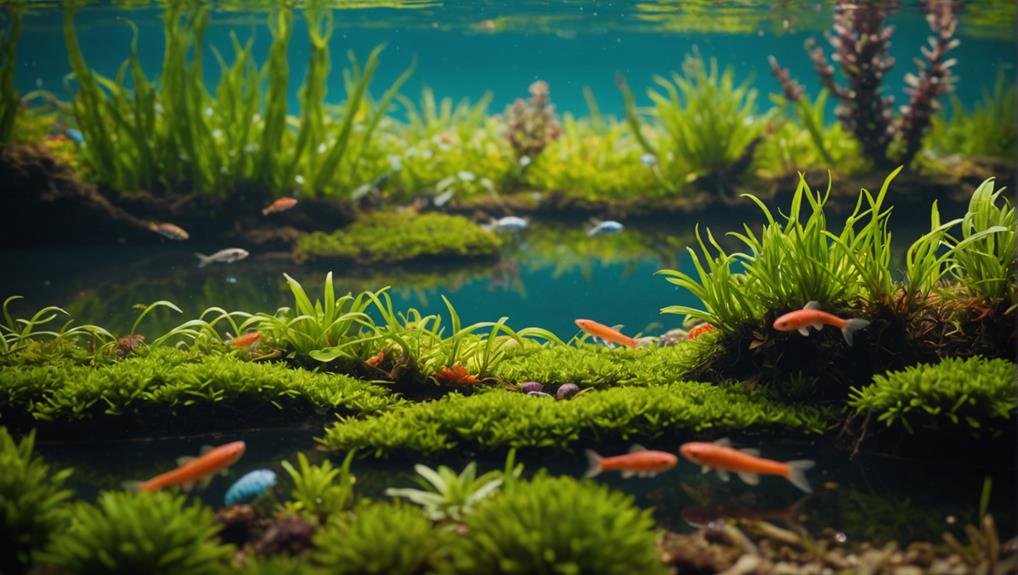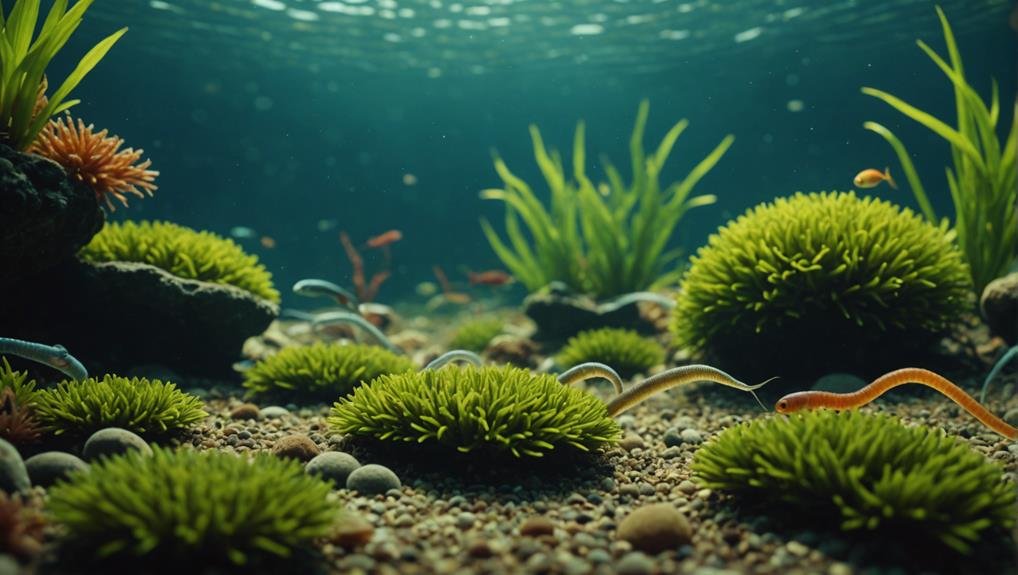Aquatic worms like Limnodrilus hoffmeisteri play a crucial role in maintaining the health of freshwater and marine ecosystems. These slender, reddish worms burrow into sediments, breaking down organic matter and recycling nutrients.
By enhancing biodiversity and serving as a vital food source for many aquatic predators, these worms contribute to the balance of marine ecosystems. Additionally, they help keep waters clear and oxygen-rich by aiding in the dispersal of essential nutrients. In pond environments, their burrowing activities help oxygenate the water and prevent organic sludge buildup.
Effective management and conservation efforts are essential to ensure these beneficial creatures’ continued positive impact. For those interested in preserving ecosystem balance and water quality, understanding the role of aquatic worms is key.
Overview of Aquatic Worms
Aquatic worms, particularly Limnodrilus hoffmeisteri, are small segmented creatures around 2 inches long with a reddish hue. These worms exhibit interesting behavior by burrowing into both freshwater and marine sediments. Their slender bodies, lacking limbs or heads, allow them to move efficiently through different types of substrates. They rely on their skin for breathing and can survive without water for up to 14 days.
The presence of Limnodrilus hoffmeisteri in aquatic ecosystems holds great ecological importance. Consuming microorganisms and organic matter prevents sludge accumulation in water bodies.
Their feeding activity enhances sediment quality and contributes essential nutrients to the food chain, supporting the ecosystem’s overall health. Through both asexual and sexual reproduction, these worms maintain a stable population that continuously benefits the environment.
Ecological Importance
Limnodrilus hoffmeisteri plays a crucial role in aquatic ecosystems by breaking down organic matter. This process is vital for enhancing biodiversity and creating a welcoming environment for various organisms. These worms also serve as a significant food source for many aquatic predators, supporting food chain dynamics and promoting ecosystem resilience. Consuming organic debris helps recycle nutrients and maintain clear, oxygen-rich waters, which are essential for supporting a wide range of aquatic life forms. Overall, the presence of Limnodrilus hoffmeisteri contributes to habitat restoration and the stability of aquatic ecosystems.
Role in Pond Ecosystems

Limnodrilus hoffmeisteri play a crucial role in pond ecosystems by enhancing water quality and serving as a vital food source for various aquatic animals. These worms are an essential part of the food chain, being preyed upon by fish, turtles, and other predators, which helps maintain a balanced ecosystem. Moreover, their burrowing activities contribute to oxygenation benefits by breaking up sediment layers and allowing oxygen-rich water to flow through the pond floor. This process supports the respiration of other aquatic organisms and creates a healthier environment. Limnodrilus hoffmeisteri‘s ability to thrive in low-oxygen conditions ensures they can continue these important roles even in challenging situations, making them invaluable to pond ecosystems.
Water Quality Benefits
Limnodrilus hoffmeisteri play a crucial role in enhancing water quality in ponds by preventing the accumulation of organic sludge. These aquatic worms burrow through sediment, promoting the dispersal of essential nutrients for other organisms. Their activities also help in oxygenation, which is vital for supporting aquatic life. Additionally, Limnodrilus hoffmeisteri contribute to maintaining a healthy microbial balance by encouraging the growth of beneficial bacteria. This microbial balance aids in breaking down pollutants, further improving the overall water quality in ponds. Their presence is essential for creating cleaner and healthier pond environments, highlighting their significance in aquatic ecosystems.
Expert Recommendations

Experts advise maintaining a careful watch over the population of aquatic worms in ponds to ensure a healthy ecosystem. Proper management is key to harnessing the positive contributions of worms without disrupting the balance of the pond. Conservation efforts play a vital role in safeguarding these beneficial creatures and their habitats. Restoring their natural habitats can help sustain the ecological equilibrium, allowing aquatic worms to flourish and fulfill their crucial ecological functions. It is essential to accurately identify different worm species to differentiate between helpful and potentially harmful ones. Regular assessments and photo documentation are recommended for precise species recognition. By following these guidelines, pond owners can nurture a thriving ecosystem, benefiting from the water-cleansing abilities of worms and supporting other aquatic life forms.
Conclusion
In conclusion, aquatic worms such as Limnodrilus hoffmeisteri play vital roles in maintaining the health of aquatic ecosystems. These often-overlooked creatures break down organic matter, improve water quality, and attract predators without seeking recognition. Their consistent efforts are essential for ecological balance, making them indispensable members of the underwater community. It’s high time we acknowledge and appreciate the valuable contributions of these humble worms, even if they don’t seek the spotlight.

